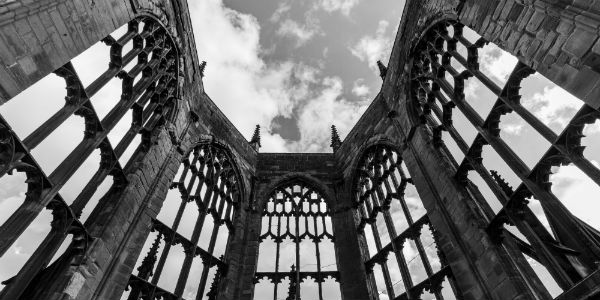‘They shall reap the whirlwind’: how Churchill harnessed Christianity in the service of war
For centuries the Church of England buttressed a sense of Christian nationhood – which was ably deployed during the second world war by Winston Churchill. In this exclusive extract from his book The Evolution of the West, Nick Spencer explains how Churchill, who lost his faith for a while, nonetheless drew on the Bible to defend ‘Christian civilisation’. Bishop Bell of Chichester, who protested at the bombing of civilian populations in Germany, lost out on the Archbishopric of Canterbury as a result.

The ruins of Coventry Cathedral, bombed in the Blitz. Photo: XTrillion via a CC-BY 2.0 licence
A deep sense of Christian nationhood is but a vague memory to most people living today, but it is worth noting that it was anything but vague or a memory as recently as 70 years ago. Winston Churchill ended first broadcast to the nation as Prime Minister, on 19 May 1940 with the following words:
“Today is Trinity Sunday. Centuries ago words were written to be a call and a spur to the faithful servants of Truth and Justice: ‘Arm yourselves, and be ye men of valour, and be in readiness for the conflict; for it is better for us to perish in battle than to look upon the outrage of our nation and our altar. As the Will of God is in Heaven, even so let it be.”
The text he quoted to rouse his people was from 1 Maccabees 3:58-60, a book confined to the English Apocrypha since the Reformation. It was not his only Christian excursion. In an address to the nation two months later he intoned how
“bearing ourselves humbly before God, but conscious that we serve an unfolding purpose, we are ready to defend our native land…Here in this strong City of Refuge which enshrines the title-deeds of human progress and is of deep consequence to Christian civilisation; here…we await undismayed the impending assault.”
Visiting Coventry after the city was annihilated in November 1940 he quoted Hosea 8.7, “They have sown the wind, they shall reap the whirlwind.” To the Commons the following January he spoke about “the whole English-speaking world are passing through a dark and deadly valley”, recalling Psalm 23. Churchill knew his Bible, although that Bible was a mine of rhetorical rather than religious inspiration, in spite of some recent attempts to prove otherwise.
Churchill lost his cradle Christianity early on and passed through what he called “a violent and aggressive anti-religious phase,” which, he said, “had it lasted, might have made me a nuisance.” The fact that it did not last he put down to his “frequent contact with danger,” in which, “whatever I might think and argue, I did not hesitate to ask for special protection.”
Those experiences did not lead him back to Christianity. He once famously described himself as a buttress rather than a pillar of the Church, supporting it from the outside, and his wartime secretary, John Colville, noted that a Westminster Abbey sermon of September 1940, at which Churchill was present, “contain[ed] much alliteration, many fiery denunciations, a good deal of politics and no Christianity – which was what Winston had come to hear.” Churchill’s regained faith was, rather, in a providential God with a general interest in England, and a particular interest in Winston Churchill. Destiny, history, civilisation and providence merged and found their climax in a story in which Churchill was the lead player.
Christianity – or at least Churchill’s idea of it – played a key part in that story. “What General Weygand called the Battle of France is over,” Churchill told the House of Commons in his ‘Finest Hour’ speech on 18 June 1940. “I expect that the Battle of Britain is about to begin. Upon this battle depends the survival of Christian civilisation.”
For all his overpowering sense of providence and destiny, Churchill was not alone in this talk of Christian civilisation. Indeed, such rhetoric had played an increasingly important role as the 1930s had proceeded, and the British empire found itself lining up against an atheist empire in the east, and fascist/ nationalist ones in the centre of Europe. Stanley Baldwin, three times Prime Minister in the inter-war years, said in 1934 that “if freedom has to be abolished and room has to be made for the slave state, Christianity must go because slavery and Christianity cannot live together.” Lord Halifax, a prominent Anglo-Catholic Conservative who was close to Baldwin published a selection of his speeches and broadcasts in August 1940, which sounded a similar note. Arnold Toynbee lectured in the Sheldonian Theatre at Oxford on Christianity and Civilisation in May 1940. The Times visited the subject in several editorials during the year. The wartime Ministry of Information told its Religious Division to impart “a real conviction of the Christian contribution to our civilisation and of the essential anti-Christian character of Nazism.” The ‘crusade’ in defence of Christian civilisation was central to the story the English told themselves about the war.
Perhaps ironically, the churches were among the quieter voices in this chorus. As a rule, the churches were notable for their reluctance to bang the military drum. Haunted, like everyone else, by memories of the First World War and stung by the criticism of their conduct in that conflict, churchmen sought to avoid war at almost any cost. Indeed some bishops, most famously Bell of Chichester, actively challenged the mood. Bell was convinced that the Church was not the State’s “spiritual auxiliary”, as he put it. Moreover, it “must not hesitate, if occasion arises, to condemn the infliction of reprisals, or the bombing of civilian populations, by the military forces of its own nation.” This is precisely what Bell did, making a principled and unpopular stand against the British obliteration bombing campaign, which cost him the Archbishopric of Canterbury.
The churches’ reticence notwithstanding, however, the period saw the last, great flourishing of a sense of Christian nationhood. Forged by the Anglo-Saxons, modified by the Reformers, adapted by the Restoration, and used to great effect by Churchill and other wartime politicians, it was unable to stand the unprecedented changes of the post-war period, as not only Christianity but the very sense of nationhood itself, and the icons though which is was secured, came under sustained attack.
This post represents the views of the author and not those of Democratic Audit. It is an extract from The Evolution of the West: How Christianity has Shaped Our Values. Read the introduction here.
 Nick Spencer (@TheosNick) is Research Director of the Theos think-tank.
Nick Spencer (@TheosNick) is Research Director of the Theos think-tank.





 Democratic Audit's core funding is provided by the Joseph Rowntree Charitable Trust. Additional funding is provided by the London School of Economics.
Democratic Audit's core funding is provided by the Joseph Rowntree Charitable Trust. Additional funding is provided by the London School of Economics.